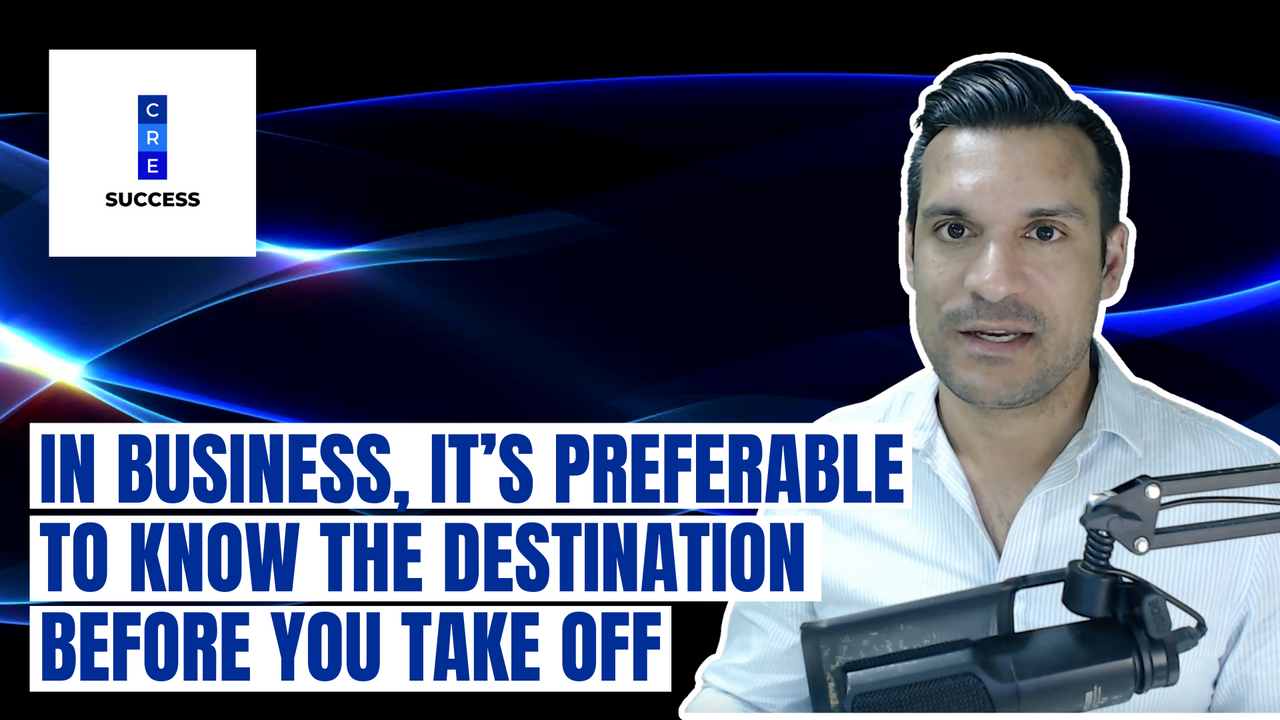Goals are difficult to achieve if you’re always on a mystery flight
Jul 21, 2022
Have you heard of a mystery flight?
They are a gimmick by airlines in Australia where the plane’s destination is a surprise to all the passengers on board.
That might be fun to do once or twice, but you probably wouldn't want every trip you take to be like that.
It's similar in business: you need to know where you're going - especially if you're taking people along with you for the journey.
Knowing the destination allows you to chart a course and describe a compelling future…it also makes it more likely your vision will be realised.
For a step-by-step guide to creating your own vision, take a listen to episode 97 of CRE Success: The Podcast.
Episode transcript:
I've got a question for you. Would you get on a plane if you didn't know where it was going?
Well, actually, you might say, "That sounds kind of fun getting on a plane, and not knowing where we're going to go."
So let me ask you another question. When you get on a plane, do you expect to know where it's going?
You do, right?
So, let's talk about how being the pilot of a plane is kind of like being the leader of a commercial real estate business.
And you need to have an idea of where you're taking the business in order to encourage people to get on the plane.
That's what we're talking about in today's episode.
Hello, welcome to Episode 97 of the show. My name is Darren Krakowiak and I help commercial real estate leaders to develop their people and grow their business.
Before we get into today's topic, I do want to give you a little gift. It's The A to Z of Commercial Real Estate Prospecting.
If you do need more qualified leads to have better quality conversations, or maybe you just want to do more deals, increase your earnings, or perhaps you're just sick and tired of prospecting the same old way, The A to Z of Commercial Real Estate Prospecting has 26 ideas to help you build a pipeline that turns into revenue faster.
So, if you're getting a little bit procrastinating, distracted, not wanting to start prospecting every day, just can't find the time to do it, or you're not getting the results that you expect, this guide is always going to help, you if you're a leader, to provide new ideas to your team.
Go to cresuccess.co/abc to download the guide.
Now we're talking about leadership over the past couple of episodes. And I've got some more content for you as part of this leadership series that we're running on the podcast.
And today's episode is all about vision. And I started the episode by talking about an aeroplane that doesn't have a fixed destination.
Because when you get to the airport, you want to know where you're going.
And I was thinking about there was this gimmick that some airlines used to run in Australia about 30 years ago called The Mystery Flight.
The whole plane is full of people who have nothing better to do but to fly somewhere and not know where they're going.
And what would happen is you go to the airport, and you booked the Mystery Flight.
And I say that, "It has nothing better to do, maybe they're extremely adventurous and excitement-oriented people for being willing to do that."
But then I was actually looking it up as I was preparing for today's episode.
And I found out that you could still do mystery flights. I thought this was some relic of the 1980s. But they still actually exist, apparently.
But what I want to say about this, as I said at the top of the show is that you probably do expect to know where you're going when you get on a plane unless you're on a mystery flight.
And certainly, I think the pilot is not on a mystery flight. The pilot gets told where they're going.
I would imagine the day before or whenever they're rostering for the pilots that are just rock up and be told, "Hey, guess what, you're flying to Brisbane today."
So this is related to vision in the respect that we need to know where we're going, and where we're taking the business as leaders if we want people to follow us.
And I think vision is something that sometimes when I speak to clients and prospective clients about it, they say, "Well, if they're working in a small company, we don't need vision, we're not a big company."
Or if you're working for a big company, they say, "Well, I don't need a vision because that's something that the marketing department and the board of directors and whoever takes care of that's not really my domain."
But I think vision is not just for big companies. It's not just for company wide strategic direction.
Vision is just about where we want to go in the future. It's just a statement about a desired future.
And when you're thinking about vision, you can create a vision for yourself, which is kind of like personal goal setting.
But when you're in a leadership position, I think you need to be creating a vision that is not just about you.
And your vision should be something that is relevant to all the people that you lead and also to the constituents that you deal with in your leadership role.
Now, when you're crafting a vision, it doesn't have to be revenue based.
So, sometimes people feel like "Well, we've got to say that we want to be number one, that's got to be our goal."
Not everyone needs to be number one. And that's not going to be the goal of everyone.
But I would recommend that when you're creating a vision for your team and even when you're setting a goal for yourself, the outcome that you desire represents some progress from where you are now.
And hopefully it represents something that you would be proud to achieve, as opposed to just a prediction about the future.
So, it's aspirational, as opposed to just being a forecast.
Now, for some businesses, it's not even going to be related to revenue. It could be around culture.
And sometimes I hear people say, "Well, we've already got a great culture, we don't need to be setting visions about our culture, we're already there in terms of we want the business."
And I say, "Well, great. But where is it that you want that great culture to get you? So how can we turn the culture that you have into a tangible result that can be around the vision or the vision can feed into that desired future?"
Your vision could also be around specific outcomes in relation to clients.
So, maybe you want to be the service provider of choice for a particular segment of the market.
Your vision could also be around the reputation of the business, or the team, or the group of individuals and what it stands for, or each of the people in the team stand for.
So perhaps you want to be known for running the most exciting option campaigns for a particular type of stock.
So, it can be quite specific. It can be a little bit more broad. But whatever your vision is, it really should answer or division.
Once you've said it should help you answer three questions. Or you should consider these three questions when you are setting your vision.
And the three components of vision are, where are we going?
So, I think it's probably something which is a short to medium term aspiration. So maybe around that three year mark. It's a good basis of time.
It doesn't have to be, but three to five years is a good sort of timeframe in order to set a vision and then put some plans in place in order to get there.
Then we want to know, how will we know when we get there?
So what are some KPIs? What are some markers of success that we can put in place, that will verify that we have successfully achieved that vision?
And also, we want to set some markers, which will tell us that we are on track to achieve that vision.
And the third part of vision is, why does this matter?
So, what will the achievement of this vision mean to our employees, to our clients, and to the owners of the business to our shareholders?
And, you know, saying we're going to be number one is great, but what's the point of that?
What does that actually get us? What does that mean for the people who we serve, the people who work with us and the people who we work for?
Setting a vision is a worthwhile exercise, because it creates buy in.
You can set a compelling vision of the future, which will get people on board to helping turn that vision into a reality.
It sets a direction. A direction, not only for your external sales and marketing, but also for the content that you create.
And that you pick the way that you position yourself in the market can reflect and serve that vision. And that also provides a purpose internally.
So people understand the reason why they're doing things. And there are a lot of studies that show that if you tell someone to do something, they're less likely to do it if you don't give them a reason.
And the reason, funnily enough, the study shows doesn't even need to be that compelling. Now, for setting a vision, I'd recommend that you do have a compelling reason.
But just having a reason for it will make it more likely that people will be motivated to actually work towards achieving what it is that you would like them to do.
And I think most importantly, is that when you've got a vision, it creates the environment where you can start to conduct the activities, and acquire the attributes that you need to adopt and the activities that you need to conduct in order to achieve the future vision.
So, until you actually say that 'This is what we want to achieve', then you're kind of back in the mystery flight stage, and you're not really knowing where you're going.
But once you kind of have that North Star, that idea of 'This is where we're going,' 'This is how we know we're on track' and 'This is how we know when we get there,' and 'This is why it matters,' then everything can sort of move towards that direction.
Not only consciously but even a little bit subconsciously, because people are reminded of what's important.
They can ask questions when they're doing something. Does this actually serve the vision?
And if it doesn't, then, they might actually decide that's not a priority for the business. So, it can really help focus everyone in a certain direction.
Setting a vision for your team and for your business is one of the first things that we do together as part of the business and leadership coaching program that we offer at CRE Success.
If you're interested in having a discussion about how we can help you develop your team and grow your business, go to cresuccess.co/leadership and let's make a plan to get your business growing faster.
As always, really appreciate you being there. Thank you so much for listening, and I will speak to you soon.








